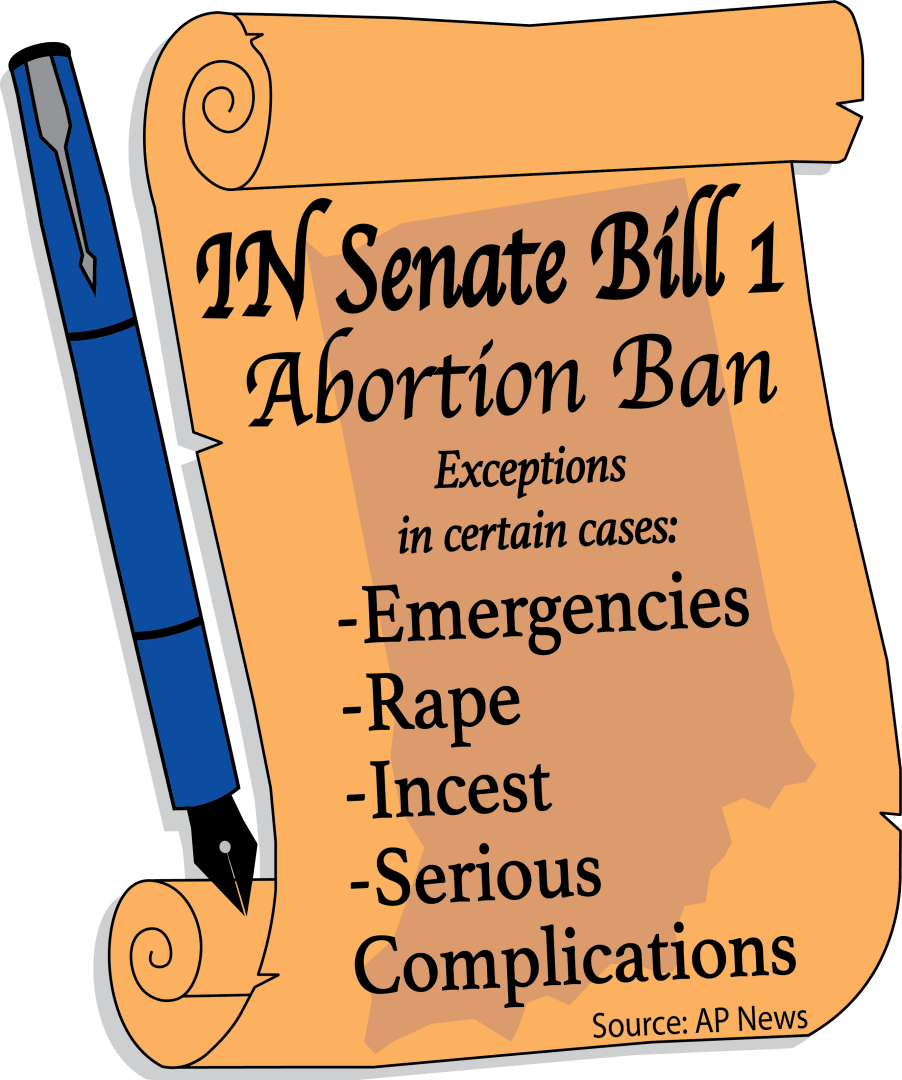Indiana became the first state to approve abortion restrictions on Sept. 15, following the Supreme Court’s decision to overturn Roe v. Wade in June. However, after a lawsuit was filed by Indiana abortion clinic operators claiming that the new law would strip the rights of those seeking abortion care, according to AP News, the law is now on hold. A preliminary injunction was issued by Owen County Judge Kelsey Hanlon that essentially prevents the law from going into effect until the lawsuit is complete, according to Politico.
The law, which went through the Indiana legislature as Senate Bill 1 (SB 1) during a special session over the summer, makes changes to when during a pregnancy an abortion can be performed and terminates the licenses of abortion clinics in the state, according to the text of SB 1.
The bill content outlines that a pregnancy can be terminated in cases of rape or incest and serious health risks that complicate a pregnant person’s medical condition (not including psychological or emotional conditions). Within these conditions, an abortion may be performed within 20 weeks of pregnancy if it is to prevent serious health risks or death to the pregnant person or if the fetus is diagnosed with a lethal fetal anomaly. An exception is made within 10 weeks after fertilization if the pregnancy is a result of rape or incest. Additionally, the state health department will only license and regulate hospitals, ambulatory outpatient surgical centers and birthing centers to provide abortions, as long as they fit the criteria outlined in the bill. Abortion centers are no longer permitted to terminate pregnancies when this law is in effect.
State Senator Jack Sandlin, R – District 36, voted in favor of SB 1 and said he thinks giving unborn babies the opportunity for life is a good thing. He and his wife identify as pro-life and have interacted with other pro-life people in the community, as well as contributed to charities and non-profits that support teen mothers. Sandlin said he thinks there are a lot of people in the Indiana community that are opposed to terminating pregnancy.
“It’s not about my personal belief, but it’s about where public policy comes down,” said Sandlin. “And there are arguments for and against exceptions for rape and incest. And I think that the bill, the way it came down. . . induced me to vote for it, quite frankly. And I thought the amendments that were offered were reasonable…I think that having the exceptions that are in the bill reflects the state,” Sandlin said.
With the issuing of a preliminary injunction, SB 1 has been halted until the lawsuit is complete, meaning that for the time being, abortion access is the same as it was prior to passing the bill, according to Politico.

Since Roe v. Wade was overturned, Indiana has become an important regional hub for abortion care, according to an email statement from the spokesperson for Planned Parenthood Great Northwest Hawai‘i, Alaska, Indiana and Kentucky Nicole Erwin. She said the organization will continue to see an influx of out-of-state patients as other states begin to pass abortion restrictions as well.
“We’ve been preparing for this moment, so months ago we began a thorough evaluation of our patient needs, operations costs, and the future of care in each of our health centers,” Erwin said. “We’ve invested in our patient navigator team so that we can stay close and help guide patients through the process of getting care out of state, connecting with abortion funds, and providing follow-up care in their home states–this preliminary injunction is more critical than ever in making sure Hoosiers and patients outside of Indiana have access to time-sensitive, basic care.”
City-County Councillor Ali Brown of Indianapolis District 5 has been focused on advocacy work for abortion rights protection since the Supreme Court’s decision was announced in June. In July, she authored a resolution that Indianapolis supports the right of persons to choose what happens to their bodies, and she said it was written with the intention of showing constituents that the city’s beliefs do not always line up with what is coming from the statehouse. The resolution passed along party lines.
“I have been working with different departments inside of Indianapolis, talking with organizations across the country, talking with other councillors in similar positions–Blue [predominantly Democrat] City [inside a] Red [predominantly Republican] State kind of thing–and talking about what we can do…,” Brown said. “I hope to have a couple of more protections for pregnant people inside of our county limits, hopefully before the end of this year, passed or at least introduced.”
Brown’s main focus right now is pushing through legislation that could help pregnant people, she said, and is doing her best to advocate as a private citizen and using her political podium. She said she has been working to register people to vote in the upcoming midterm elections and is raising money and knocking on doors to help more pro-choice candidates get elected.
“Democratic voices are underrepresented; pro-choice voices are underrepresented. We know like 80% of the state is pro-choice. And that’s not reflected in our legislature,” Brown said. “So everything we can do–we’re going to call for every vote for everything, and we’re going to hold them accountable every which way we can. . . . We’re not going to make this easy for them.”








